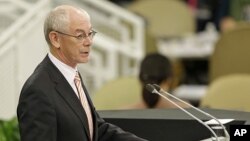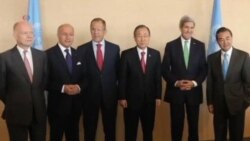UNITED NATIONS —
Atop the agenda at the second day of the U.N. General Assembly in New York were the Syria crisis, the International Criminal Court, the recent mall attack in Kenya and other issues as more than 30 presidents and prime ministers took their turn at the podium and attended meetings.
EU President Herman van Rompuy spoke strongly about the need to end the Syrian conflict, and said that when world leaders met last September, there were 25,000 dead and 250,000 refugees. Today, that has skyrocketed to more than 100,000 killed and 2 million refugees.
“We cannot let this spiral of criminal, sectarian violence pursue its dreadful course at the heart of the world’s most unstable region. What will the situation be when we meet again next year?” asked van Rompuy.
U.N. Secretary-General Ban Ki-moon had a working lunch with the foreign ministers of Britain, China, France, Russia and the United States to discuss the crisis and U.N. efforts to end hostilities and move toward a political settlement. They also discussed efforts to inspect and safeguard Syria's stockpile of chemical weapons.
Nearly two dozen countries became signatories to the Arms Trade Treaty Wednesday, which upon going into effect will regulate the international weapons trade. The U.N. says more than a half million people are killed globally each year by conventional arms.
The United States is the largest arms exporter in the world, so it was significant that Secretary of State John Kerry was among the new signatories.
“This is about keeping weapons out of the hands of terrorists and rogue actors. This is about reducing the risk of international transfers of conventional arms that will be used to carry out the world’s worst crimes,” said Kerry.
Also on Wednesday, Ethiopia’s Prime Minister Hailemariam Desalegn spoke as the rotating head of the African Union about discontent with the International Criminal Court and its perceived targeting of African leaders.
“Unfortunately, the manner in which the International Criminal Court has been operating left a very bad impression in Africa. Instead of promoting justice and reconciliation and contributing to peace and stability, it has degenerated into a political instrument targeting Africa and Africans. This is totally unacceptable, and that is why Africa has been expressing its serious reservation against the ICC,” said Desalegn.
Leaders also strongly condemned the terrorist attack on the Westgate shopping mall in Nairobi, Kenya, where scores of people were killed by gunmen from al-Shabab, a militant Islamist outfit.
The crisis in the Central African Republic was the subject of a ministerial-level meeting. U.N. officials say more than 1.6 million people are in urgent need of assistance there following the overthrow of the prior government by the rebel Seleka coalition in March.
The U.N. says that a General Assembly appearance by Sudan's president, Omar al-Bashir, that had been scheduled for Thursday has been canceled. The Sudanese leader is wanted by the International Criminal Court on charges of war crimes and genocide in Darfur and could have risked arrest by traveling to New York. Instead, his foreign minister will address the world body on Friday.
EU President Herman van Rompuy spoke strongly about the need to end the Syrian conflict, and said that when world leaders met last September, there were 25,000 dead and 250,000 refugees. Today, that has skyrocketed to more than 100,000 killed and 2 million refugees.
“We cannot let this spiral of criminal, sectarian violence pursue its dreadful course at the heart of the world’s most unstable region. What will the situation be when we meet again next year?” asked van Rompuy.
U.N. Secretary-General Ban Ki-moon had a working lunch with the foreign ministers of Britain, China, France, Russia and the United States to discuss the crisis and U.N. efforts to end hostilities and move toward a political settlement. They also discussed efforts to inspect and safeguard Syria's stockpile of chemical weapons.
Nearly two dozen countries became signatories to the Arms Trade Treaty Wednesday, which upon going into effect will regulate the international weapons trade. The U.N. says more than a half million people are killed globally each year by conventional arms.
The United States is the largest arms exporter in the world, so it was significant that Secretary of State John Kerry was among the new signatories.
“This is about keeping weapons out of the hands of terrorists and rogue actors. This is about reducing the risk of international transfers of conventional arms that will be used to carry out the world’s worst crimes,” said Kerry.
Also on Wednesday, Ethiopia’s Prime Minister Hailemariam Desalegn spoke as the rotating head of the African Union about discontent with the International Criminal Court and its perceived targeting of African leaders.
“Unfortunately, the manner in which the International Criminal Court has been operating left a very bad impression in Africa. Instead of promoting justice and reconciliation and contributing to peace and stability, it has degenerated into a political instrument targeting Africa and Africans. This is totally unacceptable, and that is why Africa has been expressing its serious reservation against the ICC,” said Desalegn.
Leaders also strongly condemned the terrorist attack on the Westgate shopping mall in Nairobi, Kenya, where scores of people were killed by gunmen from al-Shabab, a militant Islamist outfit.
The crisis in the Central African Republic was the subject of a ministerial-level meeting. U.N. officials say more than 1.6 million people are in urgent need of assistance there following the overthrow of the prior government by the rebel Seleka coalition in March.
The U.N. says that a General Assembly appearance by Sudan's president, Omar al-Bashir, that had been scheduled for Thursday has been canceled. The Sudanese leader is wanted by the International Criminal Court on charges of war crimes and genocide in Darfur and could have risked arrest by traveling to New York. Instead, his foreign minister will address the world body on Friday.












